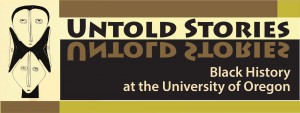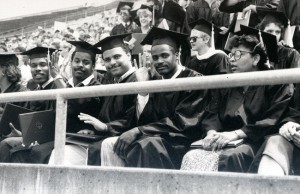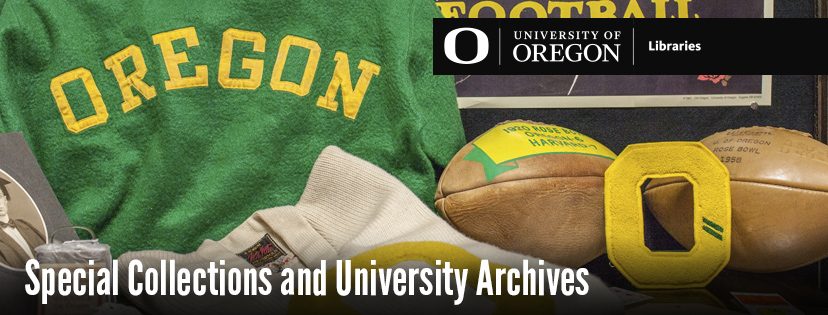Telling the Stories: Documenting Black Student Activism at UO
 This is the first of a series of blog posts highlighting the ongoing work of the Documenting UO History Project within the University Archives. A major part of this project is researching and documenting the often untold and hidden histories of the university’s diverse and underrepresented communities. This year our focus will continue to focus on Black history on campus, specifically Black student activism from the 1960s to present.
This is the first of a series of blog posts highlighting the ongoing work of the Documenting UO History Project within the University Archives. A major part of this project is researching and documenting the often untold and hidden histories of the university’s diverse and underrepresented communities. This year our focus will continue to focus on Black history on campus, specifically Black student activism from the 1960s to present.
Although the civil rights era was decades ago, it has become increasingly obvious that racism continues to plague cities large and small from coast to coast — our university, city and nation is in the midst of massive change. In recent years, campus activist groups like the Black Student Union and Black Lives Matter have addressed racism and systematic marginalization of African Americans on the Oregon campus and in the community. Last year, the Black Student Union released a list of 12 demands to address racial discrimination and cultural intolerance. One of the first listed demands was the immediate action to rename all the buildings named after individuals with ties to racist groups or ideologies, including Deady Hall and Dunn Hall. Through an established renaming process involving detailed reports from historians, President Schill announced the immediate renaming of Dunn Hall (now tentatively named Cedar Hall). Yet the status of Deady Hall still remains unknown until further review and consideration (see full message regarding the building renaming from President Schill). Interestingly, the list of demands submitted in 2016 is strikingly similar to the list of demands that the Black Student Union released nearly 40 years earlier in 1968, including the demands for more Black faculty, improved funding for Black students, and increased curriculum on Ethnic Studies, just to name a few. Why are these lists so similar and what does it say about the intervening years? This year we will be investigating this history and questions as part of the larger series within the Documenting UO History project.
Racism has been a persistent thorn in the side of Oregon’s campus life — negatively impacting students, faculty and administration. Mabel Byrd, the University of Oregon’s pioneering black female student in 1917 was forced to live off campus along with those who followed in her footsteps in the subsequent decades. Current students complain about a lack of diversity and the overwhelming feelings of being excluded. It is vital that as a campus and a community we address these ongoing issues through documentation and historical analysis. And, hopefully, with revealing our past we will change our future.
The African American’s multi-century battle for equality unfortunately remains a hidden history, which still exists to this very day. Thus it is imperative to tell these untold stories, especially on campuses across the country. Through the Documenting UO History project, we hope begin to tell the story of Black student activism on campus over the past forty years, especially since the creation of the Black Student Union in 1966, the subsequent list of demands in 1968, and filling in the gaps leading up to the most recent list in 2016, highlighting the systematic marginalization Black students have combatted in Eugene for decades. This work will include reviewing documents and testimony from the university archives, as well as other resources and oral histories gathered from community members and past students.

It is important to gather testimony from prior students who have actually lived and worked on these issues both on campus and throughout Oregon. Unfortunately, our campus does not have an extensive catalog of oral histories from African American students and staff, so we hope to lay the foundation to begin documenting those narratives by building strong relationships and collaborations with student groups and individuals. Over the school year, the project will include interviewing former and current students and staff who have directly experienced or fought against racism, and contrast these testimonies with documents reviewed in the archives. To start the project, we interviewed Mr. Herman Brame, a 1968 graduate of Oregon who was once involved in the Black Student Union. He has done a great deal of work to preserve and document African American history at the University of Oregon (see his various publications and research highlighted on our blog). Portions of the interview will be published in a forthcoming blog post in December, which will include Mr. Brame’s thoughts on the 1968 list of BSU demands compared to the most recent list.
Each month new blog posts will include recent findings as part of the the overall project and research. This is a very collaborative and open project so we welcome all participation and topic suggestions. This project will only be successful with a diverse community of scholars and students working together to find and document these testimonies. If you or anyone you know is interested in contributing to the process or participating in an oral history interview please contact us.
Joseph Foley | Student Research Assistant
Jennifer R. O’Neal | Corrigan Solari University Historian and Archivist

